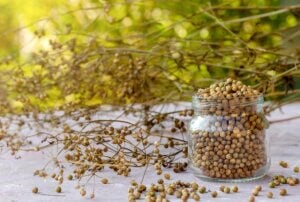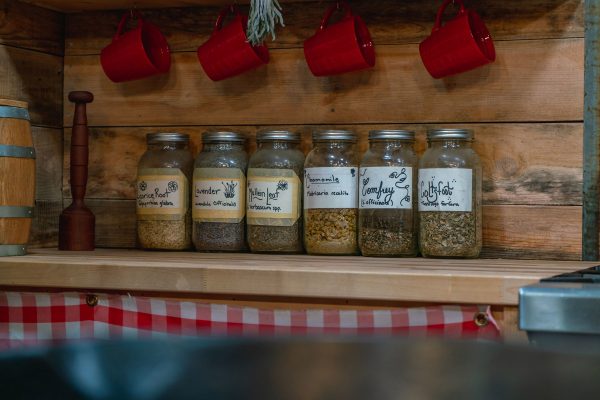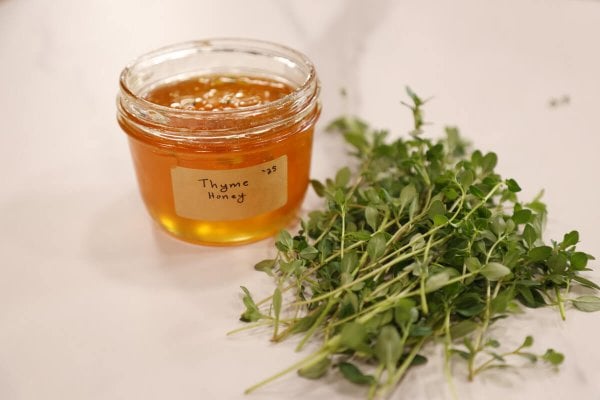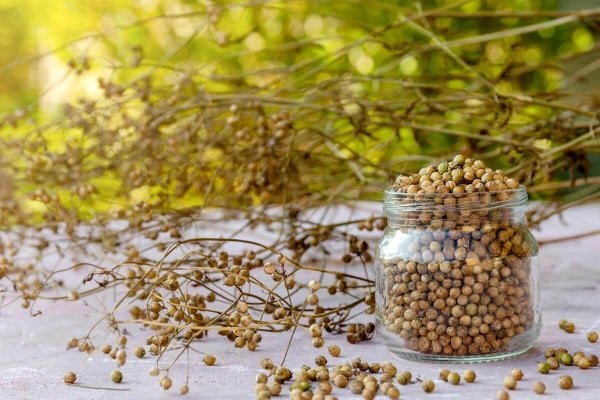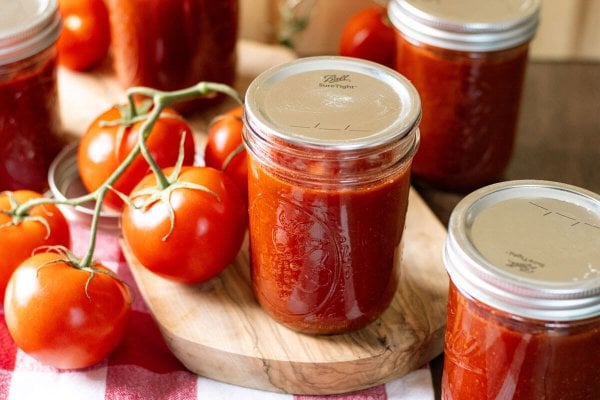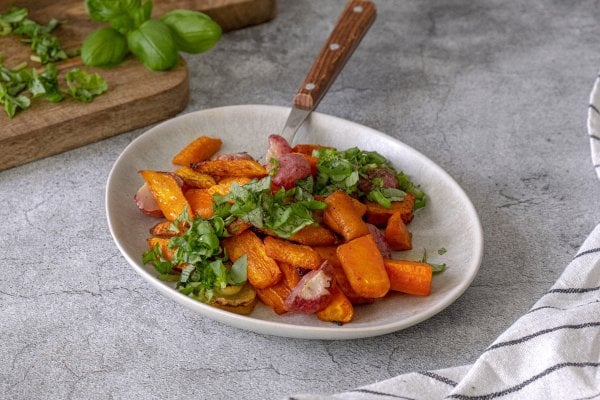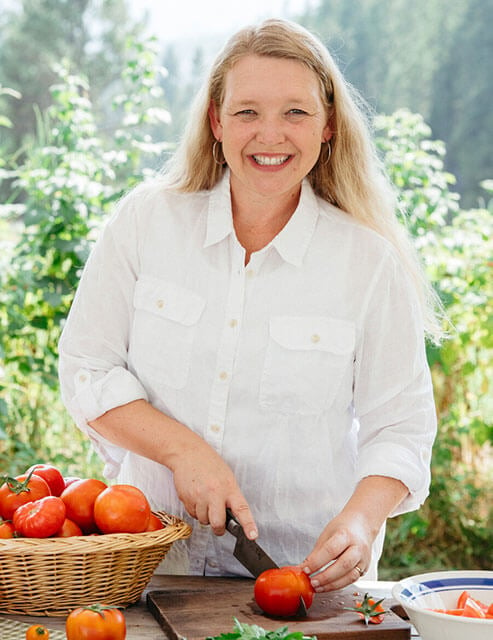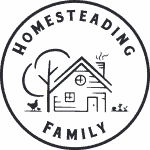We’re excited to have Carolyn back with us for this week’s episode of the Pantry Chat. Today we’re answering YOUR questions!
Topics We’re Discussing in this Pantry Chat
- Traditional Skills Summit – If you haven’t yet signed up for the FREE upcoming summit, be sure to grab your seats here.
- Substituting Chicken in Beef Stew – You can substitute chicken in my favorite canned beef stew recipe!
- Sheepshaw & Chickshaw – How we store our chickshaw, chicken tractor and sheepshaw for winter. (Find out my must-haves for a chicken tractor here.)
- Watering Systems & Getting Water to Animals in Winter – How we get water to our animals during winter and keep our water lines from freezing.
- Homesteading While Pregnant & Sick – How Carolyn manages the homestead while pregnant and sick. (Learn more on maintaining the household while mom is sick here.) Check out Redmond Real Salt’s Re-Lyte Electrolyte Mix, this has helped Carolyn stay hydrated during morning sickness.
- Staying Healthy While Traveling – Tips Josh uses to stay healthy while traveling.
- DIY Cobbler Mix – Can the cinnamon be added to the dry DIY cobbler mix? YES! Grab the cobbler mix recipe here.
- Keeping Mice & Mold OUT of the Root Cellar – Our plans to keep the mice and mold out of our new in-ground DIY root cellar. (Follow our root-cellar build here.)
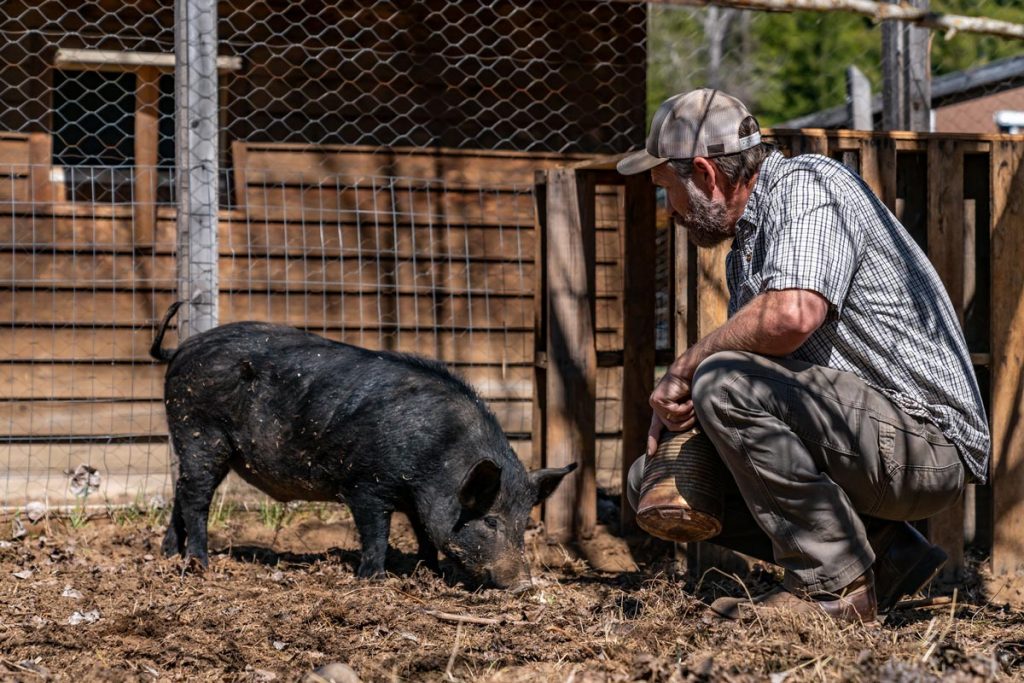
Other Posts You May Enjoy
- 10 Things I Wish I Knew About Homesteading
- How to Get Started Homesteading
- Pantry Chat Q & A – 9/28/2022
- When Homesteading Feels Urgent
- Direct Primary Care – Going “Off-Grid” With Your Health
- Health Benefits of Going Off-Grid
- How to Prepare for a Power-Outage
- 9 Emergency Preparedness Tips
- 3 Things You Must Do To Increase Self-Sufficiency
- Does Homesteading Save Money on Food
- Yearly Planning on the Homestead
- How to Buy a Homestead – What To Know Before You Buy
- Organizing Your Property’s Permaculture Zones
- Building Resilience with Justin Rhodes
Josh: Hey, you guys. This is Josh.
Carolyn: And Carolyn.
Josh: With Homesteading Family. And welcome to this week's episode of The Pantry Chat, Food for Thought. Look who's back. I'm so excited that you're here. And more so, not that just that you're here with me and with us, but that you're feeling better and getting going again.
Carolyn: I am. And I am thankful to be here. I have spent, maybe, a solid six weeks, laying in bed, doing nothing. For those of you guys who don't know, I've been struggling with severe morning sickness, but I'm moving out of my first trimester of this pregnancy, and I'm feeling better, and I'm getting up and feeling good. I'm starting to do more, again.
Josh: Yeah.
Carolyn: I'm really thankful for that.
Josh: And for those of you that were wondering, that follow along in our tracking, because of the morning sickness, a lot of you guys, a lot of folks around us, including the midwife, thought it was twins.
Carolyn: Yeah. Thought it was a good possibility of twins, just with the severity of the morning sickness. Way worse, than anything I've ever experienced. But we did an ultrasound and it is only one. There is only one baby in there, so yay.
Josh: We praise God. Take them, as he gives them, one or two.
Carolyn: It's a good thing.
Josh: One's good.
Carolyn: But I am very thankful to be up and about and doing things. But, hey, I've caught up on a lot of reading, that I've been wanting to.
Josh: Yeah. You have.
Carolyn: It was not really how I planned on spending my summer, but I read all sorts of stuff. And it's been interesting, it's been fun. I got through a lot of Tolkien. I read Jane Eyre, again. I just, that big stack of books, that I always have waiting for me, has dwindled way down, to where I'm trying to figure out what I'm going to read next.
Josh: Yeah. And you're working your way through a very interesting historical book, on the Victorian Age. She's always reading something fascinating and that we learn something from, that ultimately contributes to what we're doing, and even what we share. And this Victorian Age book is very interesting.
Carolyn: Yeah. I'm reading How to Be a Victorian, by historian... Ooh. I'm going to mess her name up. Is it Ruth Stout?
Josh: I want to say it's Ruth Stout. We should've had the book here, but I didn't know we were going to talk about it.
Carolyn: There are two different domestic historians, in the UK, named Ruth. And I mix them up, so I'm not real sure.
Josh: Yeah.
Carolyn: But it is a fascinating look at the Victorian Age, which covers a good chunk of the 1800s. And it's really based out of the UK, but it's really fascinating. That life in the Victorian Age was really hard for most people.
Josh: Yeah.
Carolyn: Health was horrible. And life expectancy dropped. It was just, most people were starving, most of the time. It was a really, really hard time because of the changes brought in by The Industrial Revolution and a lot of the things that were happening.
Josh: Interesting.
Carolyn: So it's a depressing look, at a period not that long ago, in our world history.
Josh: Interesting. Any ideas? Anything applicable, besides the history. You're usually mining for something.
Carolyn: Yeah.
Josh: She's usually looking for some bits of information, or some hack, or something. Are you pulling anything out of this, or is this just dismal history?
Carolyn: Honestly, at this point, it's dismal history.
Josh: Okay.
Carolyn: The big takeaway is, as humans, we can actually endure a lot. A lot of hardship, a lot of starvation, a lot of challenges, and still just keep trucking along and doing what we have to do. And I think, looking at our life now and the moments, where I'm like, "Oh. Life is hard," oh, it's nothing. We are very much sissies. The interesting thing about the Victorian Period, though, is, 100 years before that, people lived longer, they were healthier, the families were more intact. There was a lot of good things. They weren't pressing five year olds into full-time work, 100 years before that, it just was not done. You waited until you were 12 years old. It's just this real dark period, but people made it through.
Josh: And it's interesting because that was the blooming of The Industrial Age, which we celebrate, and we're so thankful for all of our conveniences, that it's had a lot of collateral damage, as it still does.
Carolyn: Yeah.
Josh: But, you know what? It's a good reminder, what you bring out, because things are getting tougher.
Carolyn: Yeah.
Josh: And they're probably going to continue to get tougher. And it's good to have a reference point, that, you're right, we're sissies. We're going to need to learn to buck up a little bit. And food costs, through human history, have always been higher, than they are now.
Carolyn: Yeah.
Josh: And so, we complain about them going up, but they've been much worse.
Carolyn: Yeah.
Josh: It's always been challenging to work the land, a lot of things. And so, it's good to just remember that we can do this. And we actually have a lot of great tools, that nobody else had, to help us, along the way.
Carolyn: If you're getting in to harvest season and you feel like you have long days that are really tiring, just remember that 18 hour workdays were not uncommon, back in the Victorian Age.
Josh: Yeah.
Carolyn: And that was before you went home and took care of everything you need to deal with at home. So you can make it, you can do it, you can get through harvest season.
Josh: I think, the electric butter churn, and the coffee maker, and a lot of other of our modern conveniences are great, for this homesteading life.
Carolyn: Yeah. We'll take them.
Josh: Yep.
Carolyn: Good. Well, today, we're actually answering your questions. Right?
Josh: We sure are, but I was going to make a mention... Sorry. I'm checking my reminders.
Carolyn: Oh, good.
Josh: I have so much going on, that we are going to answer your questions, but we wanted to remind you guys about the upcoming Traditional Skills Summit.
Carolyn: Yep.
Josh: Really excited. And if you haven't signed up for that, make sure you check out the link, below, and sign up. I'll be hosting. And I even get to interview you, as one of the speakers, at the summit. Along with Sally Fallon Morell, and Joel Salatin, Justin Rhodes, Melissa K. Norris.
Carolyn: Yeah.
Josh: Brandon Sheard, The Farmstead Meatsmith, and a lot of other folks. So, anyways, you guys have probably heard of that, but if you haven't, or if you haven't signed up yet, get signed up, so you get on the email list. We'll keep you up to date with what's going on and get you all the links and everything, to go to that. It's a free event, but it's also the launch of The School of Traditional Skills, where all these folks are teaching really great classes. And this launch is just the beginning, so I'm excited. I know you're excited. And-
Carolyn: You know what I'm really excited about, for the summit side of this? Is the live Q&A portion.
Josh: ... Yeah.
Carolyn: If you ever wanted to ask Joel Salatin, or Sally Fallon Morell a question, this is your chance to actually ask them a live question and get an answer. I'm really excited about that.
Josh: Yeah.
Carolyn: That's kind of cool.
Josh: Yeah. This is going to make this accessible to a lot of people. All these folks do a lot of live events, which are great, but only so many people can attend a live event and travel. And so, we wanted to make something, where you can attend, from wherever you're at, and make it really accessible and have access to them, live, so-
Carolyn: That's fun.
Josh: ... that's going to be a lot of fun. Check that out, sign up, and then stay in the loop.
Carolyn: Yeah.
Josh: Okay. You ready to dive in to questions? Yeah?
Carolyn: Okay.
Josh: Okay.
Carolyn: I'm a little rusty. You know?
Josh: You're a little rusty. And a lot of the questions are, because you've been out, on some of the videos I've done.
Carolyn: Yes. And you've been doing a ton.
Josh: There's a sprinkling, so we'll get a few in here.
Carolyn: Okay. A lot of questions are for you?
Josh: Yeah.
Carolyn: Oh. Good.
Josh: Just because I've been the recent content. But I'm looking for one, here. Blah, blah, blah. "I need to know what happened to Carolyn?" Most of these are about the summit. Okay.
Carolyn: Yeah?
Josh: Okay. Here's one, Matthew Davis, on canning chicken, "Can I mimic your beef stew recipe, using chicken, instead of beef?"
Carolyn: Ah. Yeah. That's a good one. Yes, you can. Chicken processing times are slightly less, than beef times, so you can absolutely just substitute out the chicken, and keep the time the same, and you'll be good to go. It'd be very safe. It'd be good, too.
Josh: Good.
Carolyn: Tasty. Yeah.
Josh: Do you want to-
Carolyn: You could also do pork, if you wanted, or venison. You've got a lot of flexibility, there. The one thing you wouldn't want to do and I don't think it would be great in that recipe, anyways, would be fish, because that has a lot of different requirements, when it comes to safe canning.
Josh: ... Yeah.
Carolyn: So, yeah.
Josh: Very cool.
Carolyn: Okay. Which one do you want? That one?
Josh: We'll just work down. Yeah.
Carolyn: Terri Anne, on what I learned, the video, "I live in Idaho, just south of you. I'm assuming the sheep shaw and chick shaw is something you'll be using, only during the months when the ground is green? What is the plan for the winter months?"
Josh: Yeah. You bet. You're pretty right. Green, or no snow on the ground, so you're right. Obviously, we have a lot of snow here. And, actually, in the video out, coming out, here, soon, I talk about this a little bit because several of you asked that. But yeah, we do work out of a barn in the winter. And then, in North Idaho, we need some space, so the animals go to the barn. We have frost-free bibs there, and waters, and we feed out of the barn.
Carolyn: What's going to happen to the sheep shaw and the chick shaw, during the winter?
Josh: They'll get tucked to the side of the pasture. And they'll get braced up a little bit. And so, that they don't collapse from the snow. And they'll be ready to go. I love these things, they're great. This is Justin Rhodes' design. And we're putting two of them to work. And we're probably going to do a different one for the milk cow, next year-
Carolyn: Hmm?
Josh: ... where we can actually milk out in the field. I was talking to Joel Salatin about this. And just, it creates a lot of efficiencies and cleanliness. So, anyways. Sorry. I lost my track of thought, but they're just going to sit to the side in the winter. Somebody asked that, too, about what we were going to do with the chickens, when it was snowing? And the chicken tractors? Well, the chickens go to the barn, as well. The meat chickens go to the freezer. Egg-layers are in the barn. The A-frames, we still have to just leave out in the snow.
Carolyn: I think, something you said, though, is that we learned the importance, here, of bracing the inside of the roof a little bit.
Josh: Yeah. That's definitely something we'll need to do, for the snow loads, here, is a little bit of bracing. The shaws, we might just turn upside down, as another option on them.
Carolyn: Oh.
Josh: They're very light. They're very easy to move. The A-frames, we've beefed up a little bit, and we're going to add just a little brace to them.
Carolyn: Okay.
Josh: And we'll deal with the snow. Yeah.
Carolyn: Okay. Number Two, Mary Loomis, on what I learned, "One question about the blackwater pipe system, how do you keep it from freezing, in the winter?"
Josh: All right. Well, we're going to drain it. That is a system that is out in the pasture, so it's not made for full-year use, right now. And I explained, in the video, we work towards permanent. This is a semi-permanent solution, right now. Eventually, we would bury those in the ground and put frost-free bibs in, but we want to make sure they're in the right location, they're sized appropriately, and they're serving us well.
Animals all go to the barn, we water from there. That system just gets drained, for the winter. And one thing to know, I put brass valves on because we do get a transition season and we get freezes, sometimes, that surprise us. That black poly pipe, actually, has a little more ability to expand, than PVC, as do the brass fittings, compared to the galvanized or plastic, which break much easier. So that brass is a little more expensive, but it gives us a little flexibility, if we get caught with a surprise 28 degree, 27 degree, freeze, or something.
Carolyn: Yeah.
Josh: I've seen it before.
Carolyn: And the next question goes right along with what you're talking about, here. And that is, "How do you get water to your animals, in the winter? The system you showed does not seem like it would work."
Josh: You're right. That's out in the pasture. And again, the video, I don't know if it's coming out before or after you guys see this, but I am talking specifically about water systems because I got all these questions. And so, I show you that in the barn. But we do frost-free bibs, we have one in the barn, where we can get water to the animals, easily, without dealing with that system. That is definitely a summer system.
Carolyn: Good. Let's see? You want to jump down to-
Josh: See, 11.
Carolyn: ... Number 11, there?
Josh: 11. Sure.
Carolyn: Yeah.
Josh: Yep. Let's see? Mary Ellen, I hope I get this right, Mucer? On, what happened to Carolyn? "How does one homestead, while pregnant and sick?" Good question. Something that really concerns my friends and I, as we start both homesteading and families, this is something that really concerns us, and it's a good thought, it's important to be thinking about. And she's hoping you feel better, soon. And just had her second morning sickness. It's no... "I just had my second and morning sickness is no joke."
Carolyn: It's not a joke. Yeah.
Josh: So how do you... And I think, here, really, we have the benefit of older kids.
Carolyn: Yeah.
Josh: She's approaching this from when, like our kids were little.
Carolyn: Right. And just to clarify, while this was the worst morning sickness I've ever had. And this sent me pretty much to bed full-time. I've had very unpleasant morning sickness, through every single pregnancy. And that's when I didn't have big kids around. And Josh would be out working all day, and would be gone, so I would be watching the little kids and have the homesteading tasks, that I had to do, to get done. And I think, you reference, here, you and your friends. Hopefully you live close to each other because the likelihood of you all being morning sick at the same time is pretty low.
It's just, it's really important to get community help, where you can, in those situations. And give yourself a break. You can do what you can do and you can't do more than that. Sometimes, you have to ask somebody to bring some convenience food home. Sometimes, you have to ask your church family, "Can you please make some meals for me?" Sometimes, you need to take the easy way out. But what I have found is that, whether you're sick with a cold, or a flu, or morning sickness, sometimes, Mom has to keep going, to some extent.
Josh: Yeah.
Carolyn: There isn't often an option. And so, make sure you focus on the basics, at the very beginning of the day. Use your Crock Pot and your Instant Pot. Get thing in, first thing in the morning, when you still have energy. If that's where you have a little window of energy, get things in, and get the meals dealt with, for the day. Maybe, get a load of laundry cycling.
The other thing that I really found is that doing a, "Okay. I'm going to sit down and take a break, for about 10 minutes. And then, I'm going to get up and do five minutes of work." Sometimes, you have to sit down and take a break for half an hour, or for an hour, and get up and do five minutes of work. Once you get going, you usually can get a little bit more than that done. But just that mindset that, "Okay. I'll only have to do this little bit, or this one little task. And then, I can go back to resting and to being still," tricks like that really help a lot. But again, please, make sure you slow down, if you have to. And, sometimes, things have to go by the wayside. Things we don't want to go by the wayside, but sometimes that's the option. It just happens.
Josh: Do you have any self-care, being that you've got a lot experience, here, on the side of helping your body get through it? Resting, obviously, is key, but there's water. I know you've had some strategies, you've been through a lot. And things are different for ever person, but I think you've found a few strategies, over the years, that seem to help, that I see that you do, that might help some of these young moms.
Carolyn: Absolutely. Yeah. Especially for morning sickness, stabilizing your blood sugar is about the number one, most important, thing, that you can do. And if that means eating protein and some fat, and getting away from the sugar and the simple carbs, as much as you can. Now, I know, when we don't feel well, sometimes, it's the things like Saltine crackers, that are all white flour, that sound good. If that's all you can get down, then go for that. But if you can have some nuts, have anything with some protein in there, in just small amounts, regularly. And keep as far away from the sugars, even the natural sugars, that might spike your blood sugar and then drop it way down, that's the number one key.
Also, if you're having a hard time with liquids, stop drinking just plain water. I know that sounds awful. Start making sure you get some electrolytes in it. Some sort of an electrolyte powder.
Josh: And a good electrolyte. Yeah.
Carolyn: Yeah.
Josh: Not a Gatorade, or something like that.
Carolyn: Don't go drinking Gatorade. I'm not talking about that. But you can get great... Redmond Real Salt has a Re-Lyte.
Josh: Redmond makes some great electrolytes. Yep.
Carolyn: And you just mix it into your water. So you're still getting the water, you're just getting the electrolytes in there with it. And that can help a ton. And that can help you stay hydrated, so make sure you do that. Think about your liver, whatever you can do to help your liver. Make sure you're not having any problems being constipated, or anything like that. Keep everything moving well. And all those things can help, a lot. But lots of little bits of food, with lots of protein.
Josh: There you go.
Carolyn: There you go.
Josh: Okay. Here's one, that you-
Carolyn: Okay.
Josh: ... can take, that is not quite homesteading, but I know a lot of people deal with this, and it's one I've struggled with, for a lot of years?
Carolyn: The one with Chessa?
Josh: Yes. That one.
Carolyn: Chessa [inaudible], on what happened to Carolyn, "I'm curious how you try to stay healthy, while traveling? It can be hard getting access to good, wholesome food, when traveling." Oh. Yes it is. "What tips would you give, with all of your recent travels?"
Josh: Wow. Excellent.
Carolyn: That's a really good.
Josh: Excellent question. Many of us have to travel, today. I've obviously traveled a lot this year, filming all these classes. And yeah, I've definitely developed some strategies. I've had to travel, a decent amount. Not this year, but over the years. And so, I have developed some strategies. And rest is one. Scheduling my flights, so that I can try to rest well. I don't rest well on the plane. I've tried red-eyes and just saying, "Well, I'll sleep at night," it doesn't work, so I really try to pace whatever that is. And I'm pretty particular about how I schedule my flights, make sure I can rest, the night before, and I can rest, when I get there, getting adjusted. You can't always do that, but that helps.
Water is the next one. Lots of water. Your body, just everything gets out of sync, and gets not working, and you get dehydrated, so drink lots of water. The other one that I've gone to doing is, if I can't take food with me, I buy the best quality food I can. And that can get expensive in the airport, so I'll try to stage my meals. But I try to eat fresh food, I try to eat salads, I try to eat meat. Just as clean as I can, you can only get so clean, traveling. And it costs a little bit more, but it has made all the difference. It has made a ton of difference, to eat well. Yes, it's hard. Basically, I just buy the best I can find, in the airport, if I have to eat in the airport.
Carolyn: I think, to myself, often, "What would I pay, if in this scenario, I got sick?" Right?
Josh: Yes. Absolutely.
Carolyn: "How much would it be worth it to me, to pay, to get healthy, again?"
Josh: Yeah.
Carolyn: If I'm traveling and all of a sudden I've got a flu or something, how much would I pay, to be healthy, today? And I try to think of that retroactively and go, "Okay. It's worth that amount, to stay healthy in the first place, and not even experience."
Josh: Yeah. And I'm kind of talking about flying, but it's the same with driving. I've driven a lot, hauling animals. We've had moves across the country. And the tendency has been like, "I want to get there quick, so I'm going to stop, I'm going to get gas, I'm going to get something to eat, I'm going to go to the restroom, all in the same place," which means junk food. It just, it ends up, you end up getting sick, you end up feeling terrible. And so, I've worked, even when driving, "Go find a decent restaurant. It's a good time to take a break, anyways. And sit down." And if the best you can do is get a salad, and maybe the dressing isn't great, but at least you're getting some fresh veggies and meat. That's what works really well for me. Most of the breads you're going to get are junk and not good.
Those are the core ones. The other things I do, I keep my hands off of stuff. I don't touch the toilet stuff. I try not to touch the doors, I use my elbows, I use a rag. Everybody, it blows me away, everybody puts their hands on the escalator rails. I mean, it's not just COVID, it's just, there's bacteria, there's stuff out there. You're mingling with people, from all over the country, all over the world, so try to keep your hands off of things and try to keep your hands off of your face, which I'm terrible at. I've always got an itch, or something.
Carolyn: Yeah. Okay.
Josh: But I found that has helped, a lot. Oh. And while most of us don't like masks, I know people that were wearing masks, before COVID, when they're on the plane, just for this, and it has helped them, as well. I don't really do that because I can't stand the lack of oxygen, even, with a mask, but I know people that, that definitely has helped, in general. So leave that up to you because, nowadays, that's controversial.
Carolyn: I touch everything. I am terrible. I cannot keep my hands off of anything.
Josh: You do. I've watched you. And I'm like, I don't want to bug you, but I'm like... It makes me twitch like, "Really?-
Carolyn: That's why you don't hold my hand, when we're in the airport, huh?
Josh: ... You're going to put your hand on that rail, that a thousand people touched, today?" I'm not like... I don't know if you guys know who Poirot is, but I'm not Poirot about it.
Carolyn: Oh. You mean Mike?
Josh: Well, Mike. Yeah. Yeah. No. Poirot's pretty... If you watch him, he is, too. But, anyways, just use some common sense. Try to eliminate your exposure, and stay, and eat healthy, and get water and rest.
Carolyn: There you go.
Josh: I don't know. Can you answer that one?
Carolyn: Which one? Right there?
Josh: It's a funny one.
Carolyn: Ah. Is there a request... I'm not even going to give a name on this one, but, "What is it about homesteading and men needing a beard? Is it a time saving thing? Is it some kind of protection?"
Josh: That's so funny. I didn't think it was just homesteading, man. I mean, there is a lot of homesteading men that have beards, but there's the whole hipster movement, they wear beards, I've seen, even in Southern California, when we've been there.
Carolyn: But you've often said how warm it keeps you face, in the winter.
Josh: It does keep-
Carolyn: I thought you had, that's your reason for it. That's very practical.
Josh: ... It does. Working outside, it does keep warm. I haven't had a run in with a Grizzly yet, so I don't know they're protective, as protection, or not. I don't know. I'm lazy. I don't want to shave. And I think Carolyn actually likes it better. I think I'd get in trouble-
Carolyn: I do.
Josh: ... if I shaved.
Carolyn: I think you tried, one time, and I didn't know who you were.
Josh: I did. About 2016, actually, just before we started.
Carolyn: You didn't give me any heads-up.
Josh: I went back to just a goatee-
Carolyn: I was like, "Who is this man?"
Josh: ... for the first time in years. Scared you. "You're the wrong guy in my house." Okay. All right.
Carolyn: Well, I didn't pull a gun on you, that time.
Josh: Thank you.
Carolyn: Yeah.
Josh: I did, I came home, unexpected, once. We were in move, so it was a challenging season. This is a funny story, actually. I forgot about this.
Carolyn: And it was the middle of the night.
Josh: And I had to travel. I was supposed to fly to Texas, on business.
Carolyn: You didn't tell me you were coming home.
Josh: And so, I left. And then, something happened, and I decided to just come home and sleep and get up in the morning. And we were in the city. It was a temporary place, that we were in the city, in transition. And I didn't have a key, so I couldn't get in the door. And so, I had to knock on the door, but you were-
Carolyn: You didn't know it, I was... Well, maybe you did, at that point. But I was already standing at the door because there was a strange man, walking my porch, at night.
Josh: ... And she literally opened the door-
Carolyn: Midnight.
Josh: ... with a gun in her hand. I was like, "Whoa. It's me. It's all right. Don't shoot." You don't want to mess with her.
Carolyn: No.
Josh: That's just one, of many.
Carolyn: You've got a lot of babies to protect. You know? [inaudible]-
Josh: And we've lived out, most of the time. So we're in the city, or we're out along a dirt road, and occasionally, people show up. And I'm not there, so she learned how to leverage the sound of a shotgun, real well. Anyways, we'll tell more of those, another time. Here's one for you, Patrica Furinao, an easy cobbler mix, "Is there a reason you wouldn't just put the cinnamon in with the dry mix?" Good question.
Carolyn: ... No. I don't know why I didn't do that, Patricia. In fact, a lot of people pointed that out. And I thought, "Ugh. That's a really good idea. I don't know why I didn't do that." I'm not sure, just one of those things, that it, sometimes, takes another set of eyes, looking at something, to find an even easier way to do it. Go for it and just put it right into the dry mix, it will store great, it will smell great.
Josh: Cool. Let's tackle one on the root cellar because we've got a few of those.
Carolyn: Okay. Melissa Root, on building a root cellar, "I have an old world root cellar, like this, as my home was built in the 1890s," just like this, dirt floor. "It has mice. How do you intend to keep out vermin?"
Josh: Yeah. That can be a real problem. And it's going to be a little bit of a challenge, here, because the rocks were actually larger, than I was expecting, so I was hoping to have a little more of a tighter stack. But we're probably going to have to fill that with a mortar. I'll probably do a natural mortar, or a dob. I'm not finding the words. But we'll have to fill the rocks, I'm sure, more than likely, because those are pretty large. And the base will all be gravel and the top will be sealed. But yeah, we're going to have to work, to seal that. And then, proper venting, to keep the vermin out. But that can be a major challenge, for some of these that are built this way.
Carolyn: Another question that I saw come in a lot had to do with, "How do you keep the mold out of a root cellar?" And I immediately went back to some of my reading. In the old time, they just scrubbed the root cellar, every single year. And then, whitewash it, with a lime whitewash. And that is antibacterial. And so, what that does is, it creates a surface that mold doesn't want to grow on, in the first place. That's going to wear off, through the year. So anyways, I'm hoping that we can come up with a system, so that we can at least be able to scrub it down and whitewash. We'll see how that goes with the rocks and the dob. And the-
Josh: Yeah. The rocks, that's going to be tough. I think, the other side of that, because some of those older cellars were built a little bit differently. And we have the opportunity to control venting, very well.
Carolyn: ... Yes.
Josh: And venting is a major strategy. It's something that's actually quite hard. I'm doing a lot of research on some. Some of you sent me some resources, about how to build them, and that's great. I've got the build down. I'm actually getting ready to maybe hire a consultant, for this. Because I've been looking for somebody that knows venting strategy, very, very well. I mean, there's common, just let some air in, let some air out. But there are strategies in where, and how, and how much. You can, actually, not only control that moisture temperature, so it doesn't get out of hand, with moving air through, while maintaining temperature. But you can also create microenvironments, within the cellar, so you have warmer, more humid, spaces, up top, for the things that like that, versus, cooler, a little bit dryer, at the bottom, without having to build different rooms.
Carolyn: Good.
Josh: A lot of that mold issue can be handled by venting. The other side is, proper drainage on the outside. We have got very, very sandy soil. I'm not real worried, here, about drainage coming in. But if you have clay soils, if you have soils that hold a lot of water, you need to, actually, do French drains, around those things, so that you pull the water off, from the edges, and even drain in the middle.
A lot of the old world ones would have a drain, or two, in the middle, so that if you do get any moisture, from ground water coming in, it pulls that out. And you can get that and not even see it, and that going to up the humidity and the mold, past where you want it. Those are some other structural things that you would want to research, to help control that mold and humidity, to get it to the levels that you want.
Carolyn: Good.
Josh: Yeah.
Carolyn: All right.
Josh: I think that's good.
Carolyn: Yeah.
Josh: I see we're getting out of time. And we've got some other commitments, here. It is so good to have you back and just get to hang out in the shed. Are you going to slap me in the face?
Carolyn: I was get you. Yeah.
Josh: At least you're not going to shoot me, that's good.
Carolyn: Good. It's been good to be here with you, and with you, and with you guys. A good time to be back. And happy to feel well. And nice to hang out.
Josh: Sure is. We'll, Lord willing, both see you, next week, if all go well.
Carolyn: Sounds good.
Josh: Hopefully, we stay on track. Have a good week, until then. Bye.
Carolyn: Goodbye.
Sign up to receive email updates
Enter your name and email address below and I'll send you periodic updates about the podcast.


